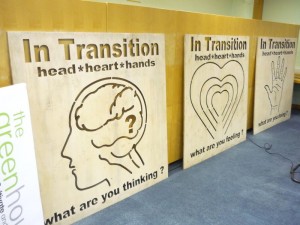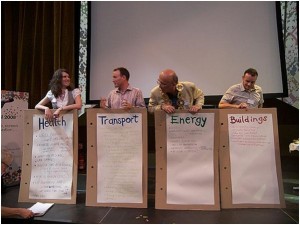26 Sep 2010
Transition as a Pattern Language: Forming Working Groups
A key part of BECOMING A FORMAL ORGANISATION is the creation of working groups. They also enable the initiative to move to creating PRACTICAL MANIFESTATIONS and to embodying the ‘PROJECT SUPPORT’ CONCEPT, whereby the initiative is driven by the people who are passionate about it and who are putting the time in on the ground to making things happen.
The challenge:
Single issue campaigns, by their very nature, attract people who are only interested in that particular issue. If Transition is seen purely as a group of people with a shared interest in peak oil and climate change, and if those involved do not get the opportunity to pursue what they are really passionate about and the skills they bring to the process, the initiative will struggle to progress.
Core Text
Transition works by creating space for people to pursue and be passionate about what it is that they are passionate about. Unlike a single issue campaigning organisation, there are many different ways into Transition, depending on what it is that fires you up. Working groups (or ‘theme groups’) come into being in different ways. Sometimes the initiative actively tries to kickstart particular groups by, for example, running a series of events about energy in order to initiate an energy group. Sometimes groups form spontaneously. Sometimes a Transition initiative ‘adopts’ a group which is already active in the community, so as to avoid reinventing the wheel. Once formed though, here are a few tips for how to maximise the possibility of their success.
It appears to work best if each group has a core of people who steer it, and who meet regularly, but where the group is also open to whoever else wants to come. Each group should be continually asking itself ‘who isn’t here that should be here?’, that is, always being open to exploring new ‘avenues’ by which new people with relevant skills can be drawn into the group. The key task of each group is to explore the question: ‘what is a vision for a low-energy [insert name of community] in relation to this field, and what might a timetable for that look like?’ The group is assembling ideas and information that will enable them to put together their section of the Energy Descent Action Plan.
 Each group has access to the relevant section of the project’s website, and will also be able to use the logo in its publicity materials. The final thing to say on the question of setting up groups is that you cannot assume that everyone who offers to form and facilitate a group actually has the skills to do so. Offering some kind of training at an early stage in RUNNING SUCCESSFUL MEETINGS (2.4) can make the different between success and failure for some groups.
Each group has access to the relevant section of the project’s website, and will also be able to use the logo in its publicity materials. The final thing to say on the question of setting up groups is that you cannot assume that everyone who offers to form and facilitate a group actually has the skills to do so. Offering some kind of training at an early stage in RUNNING SUCCESSFUL MEETINGS (2.4) can make the different between success and failure for some groups.
There is no ‘right’ mix of groups, the mix you end up with is determined by those people involved. For example, Transition Town Lewes has the following: 10:10, Arts, Business, Currency, Energy, Food, Health, Heart and Soul, Schools, Textiles, Transport, Village Connections (linking the town to the surrounding villages), Waste and Water. Transition Town Berkhamsted has energy, food, transport, waste and food groups, and Transition City Lancaster has groups focusing on Energy, Building and Design for Life, Food and Growing, Heart and Soul, Real Wealth and Livelihoods, Skills for Community Building, Transition Arts, Transition Education, Travel And Transport and the TCL Networking Group.
The solution:
The energy that sustains Transition is its ability to harness what people are passionate about. We like to think of it as ‘engaged optimism’. Either actively initiate or facilitate the emergence of working groups on food, energy, education and so on, whatever people are passionate about. See the role of the wider Transition initiative as being to support the working groups.
Connections to smaller patterns:
Working groups will work best if there has been some training in RUNNING SUCCESSFUL MEETINGS at an early stage, and if people are aware of the importance of CIVILITY/MANNERS. When Transition initiatives reach the stage of holding UNLEASHINGS, this can be a great opportunity to showcase each of the working groups. There are practical questions such as whether each group takes its own responsibility for COMMUNICATING WITH THE MEDIA, or whether press releases need to be centrally checked just to make sure the voice the initiative is putting out in the media is consistent. Each group building its own NETWORKS AND PARTNERSHIPS greatly benefits to the wider project.
* * *
Please leave feedback and comments, suggestions for alternative pictures, anecdotes, stories and projects for this pattern here.
